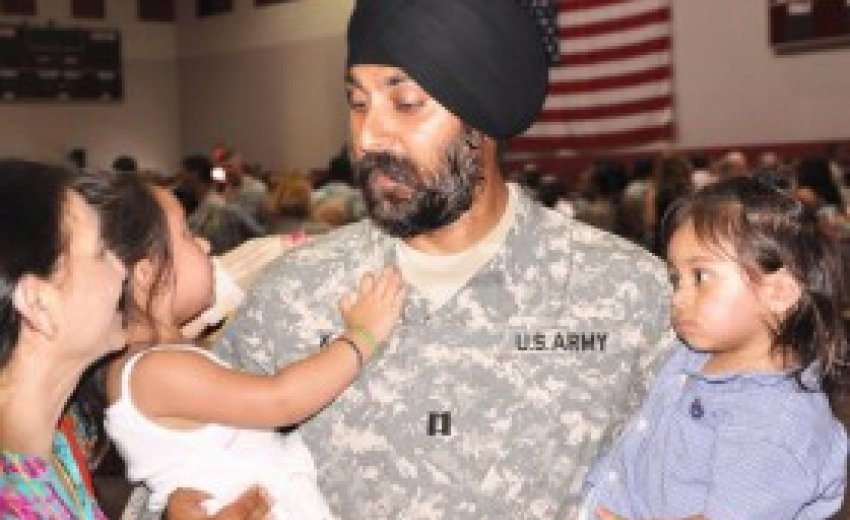Kamal Singh Kalsi served in Afghanistan in 2011, running a field hospital in Helmand Province. Kalsi, a major who received the Bronze Star and a client of The Sikh Coalition, serves in the 404th Civil Affairs Battalion at Fort

15 Dec 2014 Uniform policy should be altered to accommodate symbols of religious adherents
I recently went for a run. It started to rain, but I kept on going. I thought back to the countless times I ran the fence line during my deployment to Afghanistan in 2011. I was a U.S. Army captain serving my country by providing emergency care to our soldiers on the very austere front lines of war.
We ran in the rain, in dust storms and in unforgiving heat. One of my lasting lessons during those runs and over my 13 years of service was that we rarely had ideal conditions for what we needed to accomplish, but whatever adversity we encountered we were always there for each other regardless of the conditions or our differences.
I joined the Army during medical school, seven months before the Sept. 11 attacks. Although some civilians at the time called me a "terrorist" and "Osama" and told me to "go home," my fellow soldiers treated me like a brother and understood that my New Jersey home was no different from their own.
The Army respected my Sikh religious beliefs by giving me a special accommodation so that I could wear a turban and maintain uncut hair in accordance with my Sikh faith.
Two other soldiers - Capt. Tejdeep Singh Rattan and Cpl. Simran Preet Singh Lamba - received similar accommodations.

Let me be clear - we were not given a free pass on any of the safety and uniformity standards that protect and define soldiers. We completed basic training and proved that we could wear protective gear, including helmets and gas masks. We were required to maintain our beards neatly and wear turbans of a specific color to match our uniforms.
Two of us successfully deployed to Afghanistan. The three of us have received awards and promotions for our service. Far from being an impediment, our faith gives us the strength to succeed as soldiers, just as it did for my father and grandfather and for thousands of Sikhs in armies throughout the world.
 |
| Capt. Tejdeep Singh Rattan and Capt. Kamaljeet Singh Kalsi |
Sikhs believe that all people are equal in dignity and divinity. The turban is both a spiritual crown and a reminder to lead an ethical life. Our hair is left uncut out of respect for God's creation and required to be groomed.
Observant Sikhs also carry a kirpan - a small religious sword - as a reminder to stand up against injustice.
During their formative years in India more than three centuries ago, Sikhs maintained these articles of faith in spite of religious persecution by Mughal and Afghan invaders. Our Sikh legacy represents a proud and patriotic people who served by the thousands in both world wars, and maintains its articles of faith in the modern military forces of Canada, India and the United Kingdom.
Our faith and traditions are not in conflict with American values; they embody them in the most fundamental ways.
 Earlier this year, with the support of the advocacy group The Sikh Coalition, 105 members of the House of Representatives and 15 senators sent letters to the Department of Defense urging the U.S. armed forces to modernize appearance regulations so patriotic Sikh Americans can serve the country they love while abiding by their articles of faith.
Earlier this year, with the support of the advocacy group The Sikh Coalition, 105 members of the House of Representatives and 15 senators sent letters to the Department of Defense urging the U.S. armed forces to modernize appearance regulations so patriotic Sikh Americans can serve the country they love while abiding by their articles of faith.
These letters had bipartisan support; however, this policy isn't a political issue, it's not a safety issue, and it's not an issue for the non-Sikhs with whom I have gone to war. This is a basic employment discrimination issue.
The lawsuit filed recently by Hofstra University student Iknoor Singh should lead to an accommodation into his school's ROTC program. This isn't about just resolving the rights of one Sikh American, it's about reversing a policy against all Sikh Americans that runs counter to our founding principles of religious freedom.
If my time in the Army taught me anything, it's that when adversity strikes we band together and find solutions. This policy might be bureaucratically complicated, but the solution is as simple and straightforward as it gets.
Iknoor Singh should have the right to serve like I did, but shouldn't require a special accommodation or a lawsuit to make that possible. That's not who we are as a nation and it is time that our armed services finally recognize that.
---------------------------------
Related Article:
http://www.sikhnet.com/news/19-year-old-singh-fights-serve-us-military
